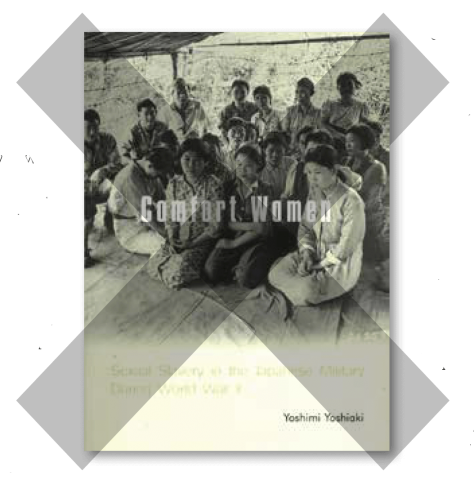Issue:
A comment during a packed FCCJ presser has triggered a potentially bitter libel trial
Defamation from the Club dais?
by David McNeill
Yoshiaki Yoshimi is recalling the day he was called a fraud at the FCCJ.
On May 27, right wing lawmaker Fumiki Sakurauchi told an FCCJ audience there is “various evidence” to prove that Yoshimi’s research on Japan’s wartime comfort women is a fabrication. The Japanese word he used was netsuzo, which most dictionaries translate as “forgery,” “falsehood” or simply “cooked up.”
“I couldn’t believe it,” says Yoshimi, a professor of modern Japanese history at Chuo University and author of the most authoritative study on the sex slave issue*: “I’ve been doing this for over 20 years. It was a shock to hear someone say I was making it all up.”
The comment passed without protest during the packed presser for Toru Hashimoto, joint leader of the radical conservative party Nippon Ishin no Kai (Restoration Party). Sakurauchi sat to Hashimoto’s right and was otherwise silent during the event, which was called to discuss Hashimoto’s own controversial comments on sex slaves.
Both men are part of a large and increasingly vocal group of conservative politicians who deny the Japanese state was involved in herding what some scholars estimate to have been 200,000 Asian women into military brothels. Yoshimi has spent half his life trying to prove them wrong.
Among the expert testimony he cites is a wartime navy officer called Yasuhiro Nakasone, later prime minister. In his memoirs, then first lieutenant Nakasone recalls setting up a “comfort station” a euphemism for a military brothel in the Philippines after soldiers began attacking local women. “For these men, I went to great lengths and even built comfort stations,” Nakasone wrote. “In fact, they packed into them like sardines.”
Yoshimi mined government and military libraries to write his book. He says his intellectual curiosity was triggered when he found papers in Ministry of Defense archives from wartime Japanese military commanders ordering troops to set up comfort stations. “That was very different to what the government was saying.”
“It’s not possible to deny the copious records of the Imperial Army’s systematic involvement in the comfort women system,” he says. “The women had no freedom to escape from these single rooms where they were held. And they had no right to quit if they wanted to, or to refuse sex with soldiers. In that sense, they were clearly sex slaves.”

‘THE WOMEN HAD NO FREEDOM . . . THEY WERE CLEARLY SEX SLAVES.’
A soft spoken, elderly man, Yoshimi was threatened by ultranationalists after his work became public in the early 1990s. He received repeated phone calls and death threats, including one delivered by hand to his home. “That was frightening,” he recalls.
Despite appearances, he says, revisionists are losing the battle against the expanding public record on the sex slave issue. “Mr. Hashimoto, Mr. Abe and others have repeatedly said there is no evidence that the military or state was involved in directly rounding the women up. But actually there is, and it’s becoming clearer.”
“First, there is the testimony of the women,” he says, and not just in China and Korea but across Asia. “The evidence of Filipino sex slaves in particular is compelling.”
“Also, Chinese women have launched four separate lawsuits. Although the courts did not meet the women’s demands for compensation, they accepted that the women were forced. Then there is the investigation by the Dutch government of the experience of women in the former Netherlands East India [present day Indonesia]. It’s not possible to deny any of this.”
Yoshimi says his son found the Hashimoto presser on YouTube and sent him a link. “To be honest, I was surprised nobody in the audience spoke up after Mr. Sakurauchi’s comment,” he laments. The comment has been transcribed and submitted as part of a claim at the Tokyo District Court. Yoshimi is demanding about ¥20 million in compensation for defamation and infringement of his personal rights when the trial begins on Oct. 7.
If Sakurauchi wanted to pick a fight over one of Japan’s most bitterly contested contemporary topics, he could have made it easier on himself. While Yoshimi’s name has surely been repeatedly blackened in private, he can’t recall a case where his work has been so publicly challenged in front of dozens of journalists at one of the FCCJ’s biggest recent press events.
Because he threw down the gauntlet, the onus will be on Sakurauchi to prove that Yoshimi’s work is flawed or fake, not an easy task against such an experienced researcher. “It’s a very clear case of defamation,” says Yoshimi. “I’m told it will not be difficult to win.”
The outcome of the larger battle over historical memory, however, is less easy to predict. In January, Prime Minister Abe revived a panel on education reform that many historians predict will put his revisionist theories into practice. One of the panel’s declared aims is to demand rewrites of high school history textbooks, removing “disputed” facts.
It also wants to eliminate the so called neighboring country clause, which gives “consideration” to Chinese and Korean sentiments about the war. “With Mr. Abe in power, it’s not really possible to be optimistic,” says Yoshimi.
*Comfort Women: Sexual Slavery in the Japanese Military During World War II, Columbia University Press

